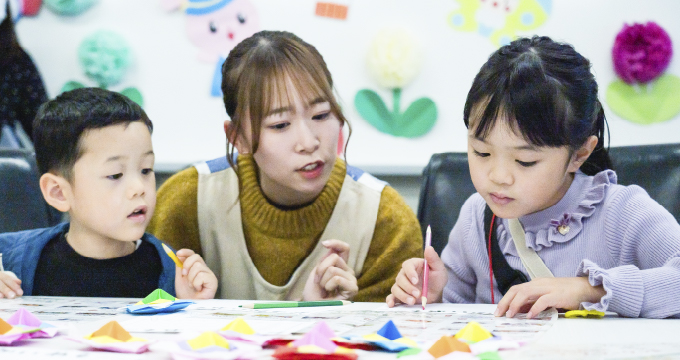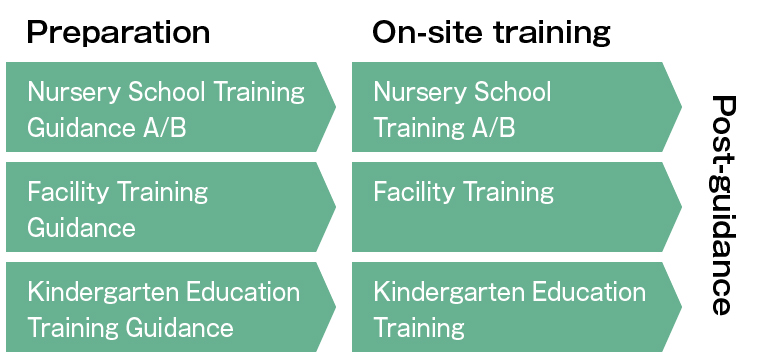Junior College
Division of Early Childhood Care and Education
The Division trains childcare workers who acquire knowledge, skills, and behavior related to childhood care and education and who, as childcare professionals, support the healthy physical and mental growth of children.
Features
- 1We have earned the trust of childcare workers and achieved a high employment rate.
-
Every year, of the approximately 190 graduates, approximately 180, or 95%, are sent out to work in early childhood care.
Thanks to the achievements of our graduates, we have earned the trust of those in the childcare field and receive many job offers every year.
Our employment rate has been 100% for 12 consecutive years.
An increasing number of students are transferring to our Faculty of Education with the desire to further their learning andbecome elementary school teachers.
- 2Students gain on-site experience through training at kindergartens, nursery schools, and facilities for a total of 50 days while attending school

-
Students learn practical knowledge and skills in understanding and teaching young children in childcare settings, and discover their own agenda. The off-campus training is a total of 50 days.
- 3With careful pre- and post-training guidance, students can perform off-campus training with peace of mind.

-
We focus on prior guidance so that you can approach the training with confidence. During the post-training guidance, we carefully reviewed the training and discovered future challenges and new goals.
- 4Obtaining a Class 2 Kindergarten Teacher License and Nursery Teacher Qualification

-
Almost all students obtain two licenses/certifications every year.
This allows you to work as a childcare teacher at a kindergarten, nursery school, or certified childcare center.
Educational objectives
The Division of Early Childhood Care and Education trains childcare workers who are equipped with wide-ranging expertise in childhood care and education, abundant human qualities, and the ability for self-learning, and who possess the practical capabilities to play active roles in the fields of education and welfare.
Three policies
Admission Policy
The Division seeks persons who are equipped with knowledge, skills, capabilities, sense of purpose, and ambition as follows.
- Persons who possess the ability to think and to take action, and basic academic ability at the high school graduation level
- Persons who are interested in interacting with other persons
- Persons who value the perspectives of children
- Persons who want to develop children’s potential
- Dynamic and motivated persons
Studies prior to admission
- Kindergarten teachers and nursery teachers require knowledge and skills in diverse fields. Accordingly, studying a wide range of subjects in high school, without bias toward specific subjects, is advisable.
- Actively engage in varied pre-admission education offered by the Department.
Curriculum Policy
This Division systematically organizes and offers the following liberal arts subjects, specialized subjects, etc.
- The Division offers subjects related to the “Basic Field” to cultivate basics for an Associate degree (Early Childhood Care and Education) and the “Liberal Arts Field” for the acquisition of rich general education.
- The Division offers subjects related to the “Childcare Basics Field” that cultivates the basic knowledge, skills, and behaviors required of childcare workers.
- The Division offers subjects related to the “Childcare Applied/Practical Field” and “Practical Field” for further applied and practical enhancement of learning in the “Childcare Basics Field.”
Diploma Policy
The Division awards an Associate degree (Early Childhood Care and Education) to persons who have completed the prescribed course and who have acquired qualities and abilities as follows.
- Have mastered the founding spirit of the University and have acquired manners, general education, and common sense appropriate to an Associate degree (Early Childhood Care and Education), and are able to contribute to society with an affection for academia, cooperativeness, and a sense of responsibility.
- Understand the societal significance of childcare and possess the basic knowledge, skills, and professional ethics required of childcare workers.
- Are able to think independently about issues in childcare, understand the minds and bodies of children from broad perspectives, and note children’s latent abilities, and are equipped with the capability to adapt to households and communities and can actively communicate information and provide support for childcare.


